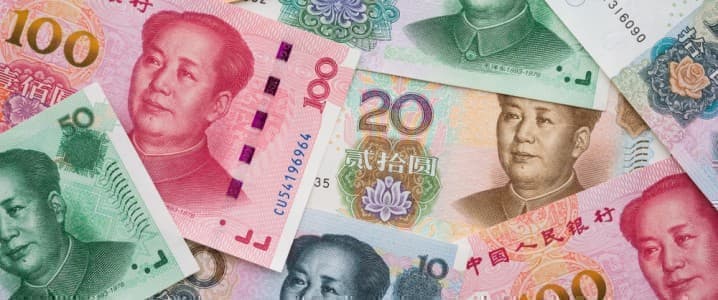Via Metal Miner
Many speculate that China’s slowdown will not only undermine metal prices but also put China at risk of experiencing a Japan-style decade of deflation. A recent Financial Times article suggests that China has tried various measures to stimulate economic growth. Examples include cutting lending rates, mortgage rates, business taxes, stock-trading fees, and admission costs at tourist sites. That said, these efforts, including extended EV subsidies, relaxed regulations, Forex market interventions, and extended stock trading hours, all started after the COVID lockdowns.
Meanwhile, the Economist recently indicated that the property sector continues to weigh heavily on the Chinese economy. When Country Garden, a major player in the industry, missed a debt payment this month, it only served to highlight the ongoing severity of the property sector’s issues.
Declining Imports and Weak Demand Could Affect Metal Prices
China’s imports also continue to soften. For instance, aluminum imports dropped significantly due to weak demand and increased domestic smelter production after water restrictions ended in Yunnan. According to Bloomberg, oil prices have lost support, with crude imports falling in Q3 and oil storage levels reaching record highs this year. In fact, current estimates put storage levels at roughly three times that of the U.S. strategic reserve. This suggests that the strong first-half imports were more for replenishing inventory than domestic consumption. The availability of cheap Russian oil and aluminum also likely played a role. Still, with subdued demand and sufficient domestic production / inventory, imports continue to decrease.
Weak consumer confidence also continues to contribute to lower domestic demand. Beijing acknowledges this and thus avoids direct stimulus measures like tax cuts or payments. This is because Chinese consumers would likely save any surplus funds, blunting the impact of such actions. According to the FT, consumers lack confidence in the economy, especially the property sector, due to the post-pandemic situation. This continues to lead to reduced overall spending. While this situation could persist for months or even years, it won’t necessarily signal the end of Chinese growth or a collapse in commodity prices, as some fear. A 5% annual growth in China now equals the consumption increase of a 10% growth a decade ago when the economy was smaller.
Property Market Woes
The property market remains a major hindrance to the economy. According to Reuters, this is further compounded by Beijing’s gradual undermining of the private sector. Indeed, construction plays a crucial role in China’s growth, making up over 30% of demand. However, the less-discussed factor is Beijing’s suppression of the private sector.
Yes, President Xi’s administration continues to favor the state sector despite the private sector contributing 80% of urban employment and 60% of GDP. Xu Chenggang from Stanford University’s Centre on China’s Economy and Institutions notes that the Chinese Communist Party fears a strong private economy could threaten its hold on power. As a result, they pass laws to hinder its expansion, which could further impact metal prices.
Is Recovery Possible?
The primary conclusion is that China is undergoing a cyclical downturn. Global growth slowdowns continue to dampen exports. Meanwhile, the property sector’s woes continue to impact confidence. This could potentially lead to civil unrest if not managed effectively. Of course, China’s increasing isolation from the West also hampers inward investment. Will growth improve? Not this year. Perhaps next. Either way, it’s doubtful the country will reach the levels of growth seen over the past decade. With the property sector’s long-term decline as an engine of growth, the economy will still grow but resemble a mature one.
By Stuart Burns
ADVERTISEMENT
More Top Reads From Oilprice.com:
- London’s Listing Exodus Threatens Its Status As Global Financial Hub
- Russian Crude Oil Shipments Jump To 8-Week High
- One-Third Of Toyota’s Global Production Frozen Due To Mysterious Glitch



















1.Consumer confidence declining, and any stimulus would be hoarded and saved, rather than spent - a bullish pressure on gold and land. The Chinese people have a historical wariness of paper and banks, a lesson often taught and well learned.
2. «However, the less-discussed factor is Beijing’s suppression of the private sector.» Ultimately power is all that matters to a totalitarian regime.
And there is always the excuse of bureaucracies everywhere (especially totalitarian ones) of blaming it on external forces. We have not seen the full force of the Mao dynasty in a long time.
How could China be losing control of its economy when it grew at 6.3% in the first half of 2023 exceeding both the World Bank’s and the IMF’s projections compared with a growth of 1.2% for the United States, 0.8% for the EU and 2.7% for the global economy (down from 3.3% in 2022)?
How also could China’s economy be slowing down when its crude oil imports have been breaking records and achieving imports of 13.0 million barrels a day mbd) in June and July this year for the first time in its history?
The Financial time is part and parcel of Western media disinformation. So its reports and analysis could easily be ignored.
It is possible, however, that a slowdown of one sector of the Chinese economy such as manufacturing or property might be cyclical but this doesn’t mean that the whole economy is slowing down since other sectors of the economy could be continuing to grow offsetting any slowdown suffered by any one one sector.
Dr Mamdouh G Salameh
International Oil Economist
Global Energy Expert